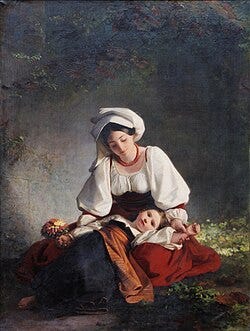In my previous Substack, I presented an idea I came across in the book Women and Power in History by Amaury De Riencourt. In this one, I will further develop my thoughts on it. The core idea could be described as this: different civilizations internally honor feminine values and principles to very different degrees. While Western civilizations have— and usually had also in the past— a high position of women in terms of objectively measurable factors like small age differences between spouses, the gradual decline of arranged marriages, inheritance options, and later also political rights, modern Western civilization, especially since the scientific and industrial revolutions onward, is also incredibly masculine in its core underlying principles. What does this mean?
Masculine principles are rationality, willpower, spirit of expansion, creativity, strong adherence to ethical aspects of religion, philosophy, or other belief systems, an outward orientation, and a technical strive to dominate the world around. Feminine principles are inward-looking, more passive, receptive, conservative, more synchronous with nature instead of trying to dominate it, more focused on inner life and mysticism than the outer life. Essentially, woman is the bringer of new life in the form of childbearing, which gives her a much more essential connection to the natural life cycle. Man lacks this fundamental connection and is more focused on emancipation from the forces of nature. Men do while women are. Men make history while women are history. Men live while women are life.
Now, none of these two principles is fundamentally superior to the other. They complement each other. However, Western subconsciousness in the past centuries, in the slow process of the development of modernity from the Renaissance forward, became increasingly oriented towards masculine principles and suppressed the feminine ones. The Renaissance suppressed the intense, all-encompassing, organic religiosity of the High Middle Ages and revered the antique values of rationality and empirical reasoning. The Reformation brought back religious fervor, but it was a fiercely ethical outlook of a very masculine nature. The Enlightenment continued with the very masculine, hyper-rational outlook, and these processes gradually fermented into the scientific and industrial revolutions, which catapulted humanity into modernity with history-shattering velocity.
Throughout all of these periods, the female principles in the mind of the West were gradually declining. The engine of civilization was increasingly Promethean, expansive, rational, technical, scientific, and outward-dominated. And it was, of course, absolutely glorious—culturally and technically. Continents were subjugated, railroads were laid across them, steel and steam and coal rolled over the layers of past traditions and outlooks. It was in this precise moment that the first seeds of the modern feminist revolution were being implanted into the Western unconscious. The modern period and the industrial revolution brought a new class of women that had never been common before in history—the housewife. Now we must talk about the concept of men as breadwinners and women as homemakers.
Keep reading with a 7-day free trial
Subscribe to Kaiser Bauch to keep reading this post and get 7 days of free access to the full post archives.



